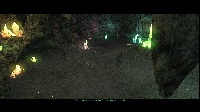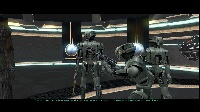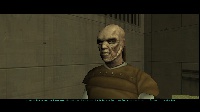Star Wars: KOTOR 2
Playtime: 27.9 Hours
Suspended 28 September 2023.Started a playthrough with TSLRCM installed as a female Sentinel, the "canon" option according to all subsequent references to the Exile. Didn't finish the game, nor did I get very far - I finished Peragus, Telos, Dantooine, and stopped partway into Nar Shaddaa at the Mira/Hanharr fight. Planets ere played in the listed order and all outcomes were for the light side path. At the time of quitting, the exile was low-20s level; Lv15 Sentinel and Lv?? Watchman. Party for most of the game thus far has been Kreia and one other rando (usually the latest to join); I don't think I got far enough to really start triggering any romance flags.
I also noticed a few Steam achievements are bugged - particularly for Dancing Queen (Vogga quest - but triggers after Peragus) and some of the 30-point skill achievements which do not trigger at the right times. Obviously this doesn't impact gameplay at all but it's pretty amusing to see these broken. Maybe it has something to do with TSLRCM?
Beat by beat, I feel like KOTOR 2 is consistently worse than its predecessor even with TSLRCM installed. At its best points, it merely matches what KOTOR 1 already achieved; at its worst, the game is almost unplayable. Before even starting this game, I feel like it had a very high bar to clear to justify its existence in the first place; KOTOR 1 was a fantastic standalone experience, one which didn't really need to have an immediate sequel. The initial plot hook of this game is not far off from "somehow Palpatine returned" - given that it takes place after the canonical LS ending of KOTOR 1, for the galaxy to be in such a disorganized state just 5 years after the first game is not only nonsensical, but even takes a strike at the purposefulness of Revan's journey. It's clear that this decision was made to maintain the possibility of the Exile being relatively young. To be somewhat fair, it's not like KOTOR 1 did a good job at timescaling the rise of the Sith Empire either, but that is a mistake that they should not have repeated for its sequel.
To delve a little bit more into my thoughts on the plot - the first area (Peragus Station) is far, far too long. It took me over 6 hours going just a bit slowly, when it should have been over in less than half that time. This entire time is spent with very few conversations, very limited unlocked mechanics, limited companions, and no real sidequests or exploration to do as everything is pretty much a hallway. It's an overdesigned tutorial that kind of sapped my motivation early on for the rest of the game. All of this is to lead up to a 2-3 minute cutscene of some random Sith guy of questionable importance. Thankfully, after this slog you land on Telos; this should have been the actual start of the game, and it reminded me greatly of Taris from KOTOR 1. There isn't quite as much to do on Telos (no swoop races for one), and it doesn't have a particularly climactic plotline, but it was fun to explore and play through the central conflict. My biggest gripes with Telos were the constant HK-50 appearances (maybe 5 squads?) and the 4 different crash landings in the story - as if the writers weren't creative enough to do anything else. The hidden Jedi temple thing was also kind of mediocre - a few people you can talk to, some dumb conversations, then you leave forever.
I feel like the game starts to really slip after leaving Telos. Just like KOTOR 1, you are given a list of a few different planets you can travel to, each with a mostly independent storyline. In this game, the motivation for doing so is to locate the remaining Jedi Masters to get them to gather on Dantooine. I decided to start with the Dantooine questline, then started Nar Shaddaa afterwards (which I never finished). Dantooine was OK - I think KOTOR 1's rendition of this place was simply better than this game since it sold a more lively atmosphere with actual people to talk to and stuff to do. In contrast, KOTOR 2 centers around a minor conflict between the settlers, scavengers, and a random group of mercenaries - but the game never makes too much effort to provide much further background to each group. Exploring the abandoned enclave is fun though, and the crystal cave & final mercenary defense mission to protect Khoonda are fun - so this planet still gets a pass even though it could have been better.
Disaster struck on Nar Shaddaa, which is by far the worst location in both KOTOR games. This includes comparisons against Peragus, the Star Forge, K1 Korriban, etc. First off, half of the quests in this shithole don't even function properly. The pazaak den glitched because the champ never showed up, the refugee rewards for eliminating the Serroco and Exchange threats were glitched so I got gypped out of a lightsaber, and I couldn't get the ship's crew for the Lunar Shadow to actually talk to me for a quest until I reloaded a much earlier save, losing a ton of progress. Also, the dancer mission didn't work - I didn't get any dialogue option to offer to dance for Vogga (I'm playing as a female exile). There's probably a few more broken things I can't think of right now. Some of them might admittedly be cut content or TSLRCM jank, but the overall experience was nevertheless unacceptable. To really slam it home, though - there are some sequences on Nar Shaddaa where you have to take fights using characters that you typically don't use, and therefore haven't leveled up. This was the way for Atton and Mira at least. In a stroke of genius (or idiocy), these enemies are scaled to your exile's level, not the level of the character you are controlling. You have to use some serious cheese strats to win, or otherwise waste a ton of levels in order to get them up to speed. But if you don't have good equipment sitting loose in your inventory, you're still screwed; you're given no option to unequip better weapons from your other party members. This was ultimately the straw that broke the camel's back - I wasn't having a good time on this planet as is, and getting stuck on the Mira/Hanharr fight for this reason just kind of drove it home that this wasn't ever going to be a very good game.
I can't even say I like the characters in this game so far, with a possible exception of HK-47 and the other HK-model droids. Atton is basically Carth, Kreia is permanently a grumpy lady, and the other characters (like Bao-Dur, T3-M4, Visas, etc.) don't seem to have much real personality so it's difficult to have any actual opinion of them. As I said, HK-47 is a fun exception to this but I'm playing LS, so unfortunately he got benched. I never met Mando/Canderous in my playthrough, but I'd have hopes for him to be a fun character as well. The female-exclusive character, the Disciple, is also kind of boring too since his personality essentially boils down into obsession over the Exile - which is actually creepy more than anything. I thought he'd be a knowledgeable sort, but he's actually more of a stupid meathead character. Somehow, he inherits Jedi Consular powers despite having 10 INT and 10 WIS - who the hell made this decision? The general issue with the characters as I've kind of alluded to is that they all feel somewhat static, despite the inclusion of an 'influence' mechanic where you are supposed to be able to push people towards LS or DS; since the likes and dislikes of each character are all set in stone, trying to do this doesn't actually work out too well most of the time in a rather counterintuitive fashion. The characters are rather predictable and none of them really try to step outside the bounds of the box they are initially packaged in - so they're ultimately just meatshields and skillboats for better or worse.
A central theme of this game differentiating itself from the first is the perspective on morality that the writing attempts to take. Kreia is a purposefully neutral character in the game, or at least she's supposed to be. The thing that Obsidian didn't account for is how comically evil DS is in the Star Wars universe, to the point that such questions about a neutral morality are actually pointless. LS simply doesn't have a long-term downside, and DS doesn't have any long-reaching benefits beyond the immediate present. What if the conflict on Telos were flipped a bit, if the Ithorians actually would have failed in their task despite their noble intensions, whereas Czerka could at least make Telos into a profitable planet? There is no goal represented in these games that can be achieved through DS options; all you end up doing is sowing chaos and misery. Consider the morality system in Mass Effect; Renegade options typically tend towards a no-nonsense, but effective approach. I imagine it's simply very difficult to straddle that line when writing games, as even ME3 (and some ME2) have their difficulties wrangling a psychotic Renegade Shepard in. This is a lesson that SW needs to learn in general, represented very clearly here - grey morality in writing must be achieved on the kindness/efficiency axis, NOT across good/evil. You should have to make tangible sacrifices to help people out for LS; granting not only more money but also more power when doing good in KOTOR 2 incentivizes a heavy-handed LS approach. (Note: this might be different in other parts of the game, or when trying to seriously min/max EXP gain. I wouldn't know, but from my experiences LS simply has too many upsides to ignore).
Nowhere is this struggle seen more than in the character conversations; specifically, with Kreia. Again, she's supposed to promote a neutral hand in influencing the exile - warning against extremes while ensuring that your character takes advantage of any opportunity to gain strength. That's what she's supposed to be, but her writing is very heavily DS-oriented in general - in my playthrough, she spent most of her time talking about why I should be more selfish & evil. The game uses a few very specific scenes in an attempt to show why kindness and reasoning is actually a bad thing somehow - in one, some guy that I gave money too just happened to get mugged; the suggestion is that I should ensure their suffering instead of granting any semblance of hope, and that losing the little hope you had is somehow worse than being permanently trapped in a mire without any helping hand. I find this to be a very childish argument, which should be far beneath the capabilities of Obsidian - it's disappointing they couldn't come up with anything better than that. Also, Kreia's counterpoints conveniently miss the other 90% of the time where LS kindness is repaid with great rewards and influence - for someone so heavily bent on manipulation, surely she can see how an initial kindness can influence others' loyalty down the line. For a character written as 'wise' to completely misunderstand such a fundamental concept of influence and motivation kind of defeats her entire purpose.
There isn't much to say about the mechanics of this game, as it inherits both the strengths and weaknesses of KOTOR 1. The core gameplay and combat are mostly untouched, and I didn't find any of the new combat mechanics like the lightsaber forms very game-changing, as the added bonuses are just a drop in the sea of other buffs and stats boosts you get through the gear and powers in this game. That being said, most of the small tweaks were generally positive. Random conversation rolls have been replaced with hard checks, there are conversation checks with all your different skills (instead of just Persuade/Force Persuade), and skills have been made even more useful with an expanded array of workbench weapon and armor upgrades, each requiring different skills to craft. To put it simply, you can't just ignore your skills in this game, as they unlock a ton of extra dialogue, quest paths, and upgrade capability to your character. Swings towards LS or DS also seem easier to get in this game; even without taking 100% LS options, I managed to hit the maximum possible alignment before even leaving Telos. Balance does tend towards being a bit too gear-heavy for my liking though; by the time I stopped, I was getting nearly +10 to some attributes & skills just from my equipment - meaning your capabilities are heavily determined by the weapons & armor you find. Before you start getting these armors in the early game, many enemies seem ridiculously overtuned, as many low-level force powers are pretty much impossible to use on enemies (specifically stun human/droid) and end up making you feel weaker than you should.





